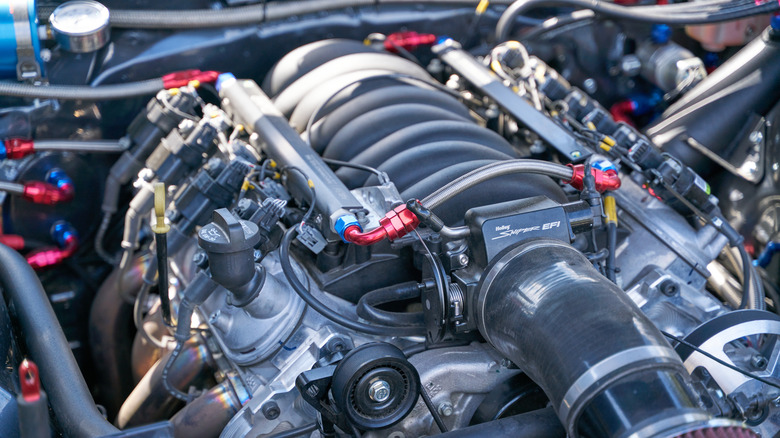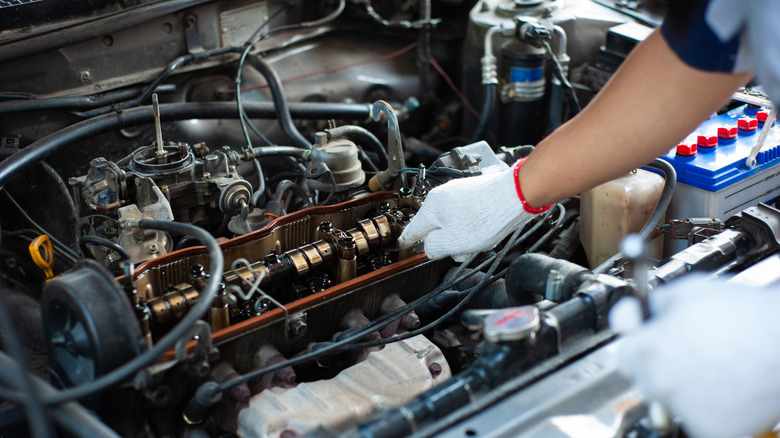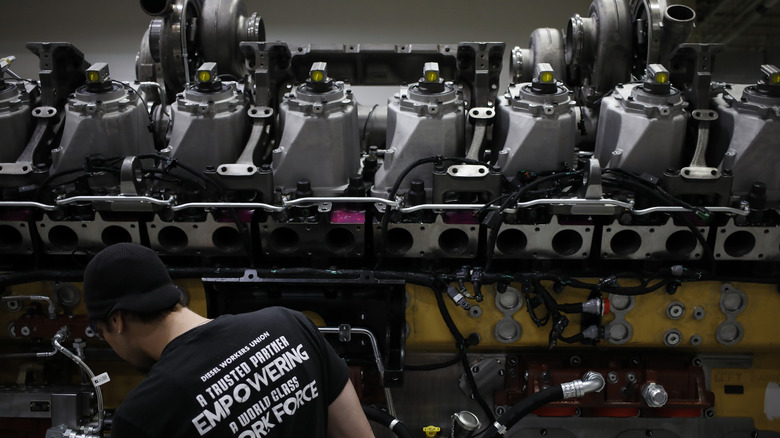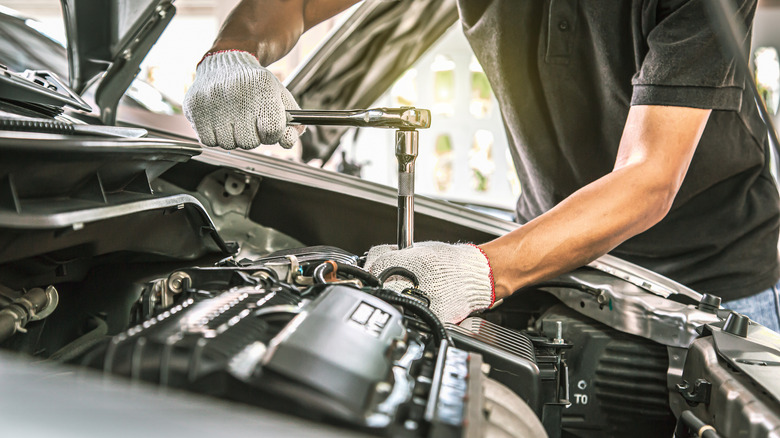How Much Does It Cost To Replace A Car Engine?
There are many components that affect the performance of your car, but the most important is the engine. Today, getting over 150,000 miles out of an engine is fairly common. However, with all the demands of the modern world, people are driving more than ever. With the high mileage Americans are clocking today, an engine is bound to eventually wear out, even with regular maintenance.
If you talk to car owners, you will quickly realize that there is nothing as heartbreaking as a completely failed engine. New engines are expensive because of the materials and labor that go into the replacement. Replacing an engine takes roughly between 10 to 12 hours. Each individual repair shop has different labor rates ranging between $90 and $150 an hour. Getting your vehicle a new engine will cost you between $3,000 to $4,000 for a regular engine or the cost can get to as high as $10,000 for more powerful engines, per ConsumerAffairs.
Factors for cost
According to Family Handyman, there are three main components that will affect the cost of your engine replacement.
The size and complexity of the engine
It goes without saying that the price of purchasing a new engine goes hand in glove with its capabilities. A regular new four-cylinder engine costs approximately $4,000 and as the capacity increases so does the price, a V8 engine goes for $7,000. It is worth mentioning that the bigger the engine capacity the more complex the systems are. So whenever you are thinking about replacing a car engine, you should know that the total cost of replacement is largely affected by the model and performance of that specific vehicle.
The nature of the engine replacement
When your engine is fried, there are essentially three options for you to choose from: a new engine, a used engine, or a rebuilt engine. As discussed earlier, the cost of getting a new engine is determined by the size and complexity of the engine. When it comes to a used engine, the major factors for its cost are the mileage, age of the vehicle it was salvaged from, and the freight charges to your location. One disadvantage that comes with a used engine are the risks. In the event that the engine fails to run after replacement, you will likely need to pay the mechanic for his labor, regardless.
If buying a new engine is too expensive for you and you also don't want to deal with the risks that are involved with salvage engines, your next best option is the rebuilt engine. A rebuilt engine is one that has been disassembled and all its faulty parts replaced, refinished, or repaired. While a rebuilt engine might not be as ideal as a new engine, the rebuilding process extends the engine's life span.
The shop rate
Depending on where you choose to do your replacement and the nature of the task, the average time taken to replace the engine can vary, but usually takes between 10 and 12 hours. However, experienced mechanics tend to work faster and charge more for the same task. Again with the average cost of labor falling between $90 to $150 an hour, the overall labor cost for the entire engine replacement will be about $1,080 and $1,800.
Additional costs
Realistically, replacing an engine involves more work than just moving the parts and bolting things together. There are other secondary materials that can bring up the costs. Here are a few that Family Handyman recommends you consider.
Secondary engine parts
Whether new or used, an engine does include other secondary parts that allow it to function properly. Some of these parts include belts, fuel pumps, hoses, and pulleys. The removal and repair of these items can attach a separate labor cost. You may be surprised how expensive the labor cost of removing, replacing, and reinstalling these parts can be, so it is essential to talk to your mechanic to figure out the total overall cost.
Other shop materials
During the replacement process, the engine will require other materials that are not purchased together with the engine. Remember, replacing the engine does not stop at anchoring down that huge piece of metal — the engine also requires lubrication and the application of several other fluids to keep it running smoothly. Your mechanic will charge you separately for the coolant freon, engine oil, and any other fluid that will be necessary for your engine. Usually, the total cost of these services will not be more than $100.
Warranty
Is your engine covered by a warranty? Well if it is, then you are in luck because the total cost of replacement is negotiable. A vehicle powertrain warranty covers the engine for a specified mileage or period of time depending on the manufacturer, per Consumer Affairs.
Types of car engines for replacement
If you have decided that your engine is beyond a simple repair, then you should be aware of the types of engines that are available for sale. According to National Motorist Association, there are four main types of engines available for car replacement.
New Engine
New engines are those that you purchase straight out of the dealership and have no mileage on them. Often described as crate engines, new engines can be quite expensive; in fact, they can sometimes cost as much as an entire vehicle. What you get is exactly the same as the engines in new vehicles, with the exemptions to some of the outer parts that could be slightly used. In comparison to the other types of engines, crate engines are the most expensive but remain the most reliable.
Reconditioned or remanufactured engines
This particular type of engine goes through a thorough process to bring it back to the original manufacturer's standard. The process begins by disassembling the entire engine down to smaller individual components. Each part is cleaned extensively by experts. The clean parts then undergo a series of tests to detect any defects and replace all the failing parts.
The final step is reassembly when all the parts are proven to be up to standard. Additional tests on durability and reliability are done after the assembly to make sure the new reconditioned engine passes all the performance checks. These engines are usually in proper condition and come with a warranty.
Rebuilt engines
These types of engines have also gone through partial reconstruction but are not as detailed as the reconditioned types. The engine is partially disassembled and only the damaged parts are replaced or repaired. Usually, these types of engines are in better shape than used engines. The cost of rebuilding an engine is relative to the experience of the mechanic — a more experienced mechanic will likely charge more. However, it is important to mention that rebuilding an engine does not eliminate every damage. It will significantly improve the state of the engine for a few years, but some old wear and tear issues can eventually come up.
Used engines
In essence, a second-hand or used engine is one that is salvaged from another vehicle to be transferred to another one of the same model. These engines are carefully extracted from vehicles from the junkyard or those from insurance write-offs. Some of these engines come with additional components like the manifold. However, it is good practice to replace these components since no one can guarantee whether or not they are functional. Since used engines are from another vehicle, there is no guarantee of the length of service when transferred to your car.
Why you need to replace a car engine
Eventually, when your engine grinds to a halt, never to fire back again, you have only two options on the table: replace the engine or get a new vehicle altogether. So is an engine replacement the right move for you? According to Chapel Hill Tire, here is how you can tell.
Cost-saving
There is no arguing that an engine replacement comes with a heavy financial implication. However, how does the cost of replacing an engine compare to getting another car? Well, if you are the frugal type, then replacing the engine is the least expensive option of the two, and could save you several thousand bucks at the end of the day.
Insurance coverage
As mentioned earlier, an engine replacement can be quite expensive depending on the vehicle and type of engine that you have. Nonetheless, if you have insurance coverage, replacing your old engine with a brand new one will make a lot of sense. You get to keep your car and at the same time, the engine replacement will bring it back to peak performance for less money.
Sentimental attachment to the car
Every vehicle is important to the owner, however, if your car holds such great sentimental value to you that it cannot be replaced, then replacing the engine might be a great option over buying another vehicle.
Reliable repair
If the choice is between changing the engine of your vehicle or settling for an old used car, then replacing your current vehicle's engine might be just right. First off, new engines give your vehicle another lease on life that is not guaranteed with an old vehicle. In addition, used vehicles have their own fair share of engine problems that might end up costing you even more down the line.
Benefits of replacing a car engine
In most scenarios, what prompts car owners to consider replacing their car engines is complete failure. Regardless of your reasons, this is how you stand to benefit from a car engine replacement, per Robs Customs & Restorations.
It is an opportunity to customize your car
Let's face it, cars are built to accommodate the needs of the general public. However, if some of the specific features of performance are not met, then the easiest way for you to fix it is through an engine change. Sometimes it is better to customize the vehicle to your liking, rather than get another. Replacing an engine can bring some subtle but important changes to your vehicle like improved fuel economy among many other things.
No increase in insurance premiums
Before you go ahead and buy a new car from the dealership, it is important to factor insurance premiums into the cost. New vehicles are more expensive and so are the insurance premiums. On the flip side, replacing your car engine not only gives your vehicle a new lease on life, but also allows you to avoid the expensive premiums that come with a new car.
Environmental conservation
Disposing of your old car to the scrap yard can be heavy on the environment. Look at it this way, how long will it take before your car gets to the crusher and makes its way to the recycling plant? Chances are that it will take awhile. Meanwhile, the fluids leaking from broken components of the car seep into the soil, therefore, increasing the carbon footprint, per via Dronsfields. Replacing your engine can be the more eco-friendly option.





